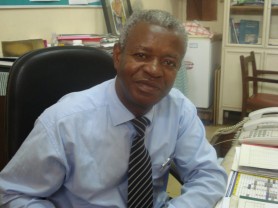A?total of 715 patients of the Accra Psychiatric Hospital have been reunited with their families under the “Mass Repatriation Exercise — Operation 600” project which started in 2010.
The project has left the hospital with 485 patients as against the 1,200 who were on admission at the start of the exercise.
“We intend to continue with this project until only 300 patients remain on admission,” the Director of the hospital, Dr Akwasi Osei, said in an interview with The Mirror.
He explained that the vision for mental health care now was community-based care, not institutional-based care.
That, he said, was to allow patients to be seen more in the community than a remote area in an institution.
The reason, according to Dr Osei, was that it was more cost-effective, required fewer resources and less-stigmatising because the patient spent little time in the hospital and more in the community.
He said when the community saw how the patient was improving, it would make it easy for the patient to be integrated into the community and the family would be more involved in the treatment and more accepting.
Explaining how the project was embarked on, he said on the average, the hospital sent 25 patients home to be reunited with their families in a month in a hospital bus, accompanied by a psychiatric nurse, welfare officers and NGOs, who acted as volunteers.
He said the patients were taken to any part of the country where they came from, and the hospital staff and volunteers, on locating the patient’s family, educated the family on the condition of the patient, medication and follow-up visits.
He said in almost all the cases the patients’ families were welcoming, except in a few cases.
In one instance, he said, the family felt bringing their kin in a bus was embarrassing, while in another case there was no responsible person in whose care the patient could be left and so the patient had to be brought back to the hospital.
More disturbing was the case of two patients whose families thought they were dead and had even performed their funeral rites.
“The families of these two thought they had seen ghosts and begged the team to spend the night there in order for the family to be sure the two were real,” Dr Osei said.
Another challenge the project faced was that some patients could not locate their homes because of wrong addresses or relocation by their families and the bad road network which made the team transporting the patients back home to sometimes walk about two or three miles in order to get to their residences.
Getting enough funds in order to undertake the project was also a problem, he said.
According to Dr Osei, due to lack of funds, especially for a hospital that did not generate any income, they were unable to get hotel accommodation for the patients and the staff who sometimes had to spend about a week on the road.
They, therefore, had to sleep in the bus, at hospitals or on school premises and be at the mercy of the weather and mosquitoes.
In all, he said, each trip cost between ¢2,000 and ¢3,000, including feeding, fuel, incidentals and honorarium for staff.
Dr Osei, however, commended the current Minister of Health, Ms Sherry Ayittey who, recognising the benefits of the repatriation, has donated a bus which has helped in sustaining the project.
“For this, we owe her many thanks,” he said.
He said despite the challenges, the project had been a success and it had remarkably decongested the hospital, making it much easier for the few staff to be able to manage the patients effectively.
He said it had also improved staff-patient ratio, reduced stigmatisation and improved overall care for the patients.
He appealed to the President to form the Mental Health Board to operationalise the Mental Health Law.
“What we are doing now is a knee-jerk reaction, which may not have a long impact,” he said.
Dr Osei said they were trying to get the other psychiatric hospitals in the country to undertake the same project, adding that Pantang, which had about 450 patients on admission, was being encouraged to reduce the number to 200, while Ankaful was looking at having 100 patients on admission, as against the current 350.
He said ultimately when the law was implemented; it would ensure that every regional hospital had a psychiatric wing with about 40 to 50 beds, while every district hospital would have about two to five beds dedicated to psychiatry.
He said when that was done, it would make it possible for psychiatric cases to be seen at the district and regional levels and that would further prevent the overcrowding at the major psychiatric hospitals in the country.
Health News of Saturday, 7 September 2013
Source: The Mirror
715 Patients reunite with families under repatriation exercise













